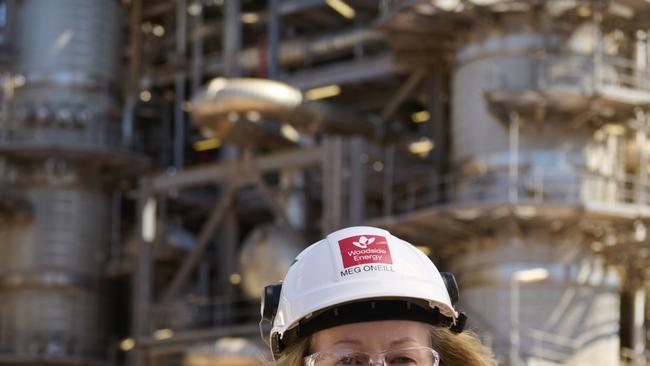Proxy adviser Glass Lewis says director should pay price for climate strategy failures
Woodside’s board is in the firing line as CEO Meg O’Neill hopes for North West Shelf certainty ahead of another AGM marked by big police presence.

Business
Don't miss out on the headlines from Business. Followed categories will be added to My News.
An influential proxy adviser has taken aim at Woodside Energy over shareholder concerns about its climate strategy, and decided independent director Ann Pickard should pay the price as the company prepares for another annual meeting marked by a big police presence.
Glass Lewis has recommended shareholders vote down Ms Pickard’s re-election to the Woodside board at the company’s AGM in Perth on May 8.
“Given the ongoing pattern of significant shareholder opposition to the company’s climate strategy, we would expect a more robust response from both management and the board,” Glass Lewis said in its proxy paper on Woodside.
“At present, we are not convinced that the response meets this standard.”
Oil and gas producer Woodside has faced significant shareholder backlash and protests that have led to arrests at its recent annual general meetings in Perth, and another big police contingent is expected this year.
The results of the federal poll where the Greens and Teals may end up holding the balance of power will be known heading into the meeting. Labor’s delay in approving an extension of the NorthWest Shelf gas project have been a major election issue, particularly in WA.
Woodside boss Meg O’Neill said on Wednesday that she looked forward to some certainty on the North West Shelf.
“As Australia approaches a federal election, it is encouraging to see both major parties recognising the essential role of gas in supporting national prosperity and a stable energy transition,” she said.
“We look forward to certainty for ongoing operations at the North West Shelf beyond 2030, to enable it to support thousands of direct and indirect jobs, billions of dollars in taxes and royalties, and secure future gas supply to WA.”

Glass Lewis has recommended a vote in favour of five other resolutions to be put to the AGM, including the re-election of directors Ben Wyatt and Tony O’Neill, who have been targeted by a “vote no” campaign.
Glass Lewis noted it had reservations about the implementation of so-called Say on Climate votes based on the view that setting corporate strategy is the responsibility of the board, not shareholders.
“However, when a company chooses to place its strategy up for shareholder approval, we would expect that this not be a hollow gesture and that a company would seriously and thoroughly evaluate any dissent to the strategy and effectuate changes that are responsive to shareholder concerns,” it said.
“In this case, we do not consider the company’s enhanced disclosure alone to be a sufficient response to the level of dissent expressed.”
Woodside asked shareholders to approve its climate transition action plan and progress report at last year’s AGM, but only 41.6 per cent voted in favour. The result saw Woodside become the first company globally to receive majority opposition to its Say on Climate vote.
Glass Lewis said the 2024 vote continued a trend of shareholders expressing significant concern about Woodside’s climate strategy and its response to feedback.
The Australian Centre for Corporate Responsibility opposes the re-election of all three directors, saying the board has collective responsibility for Woodside’s failure to address shareholder concerns reflected in the 2024 vote against the climate transition action plan.
Woodside said it was concerned that Glass Lewis had overlooked specific information the company published on its climate actions.
“Woodside has followed these concerns up with Glass Lewis, as these omissions form the basis of the recommendation against Ann Pickard, which we believe to be unfair and not reflective of Woodside’s actions in response to shareholder feedback on climate change,” a company spokesperson said.
On Wednesday, Woodside reaffirmed its 202-25 production and capital expenditure targets while reporting strong gains in quarterly production and sales versus a year ago.
The Perth-headquartered company expects full-year production in a range of 186-196 million barrels of oil equivalent, and its capital expenditure guidance for the financial year remains $US4.5bn ($7.04bn) to $US5bn.
Its March quarter production rose 9.4 per cent year-on-year to 49.1 million barrels of oil equivalent per day, while sales volume rose 10 per cent to 50.2MMBoe. Sales revenue rose 13 per cent to $US3.32bn, with the average realised price up 3 per cent to $US65 a barrel.
Capex fell 33 per cent quarter-on-quarter to $US1.81bn.
Originally published as Proxy adviser Glass Lewis says director should pay price for climate strategy failures




